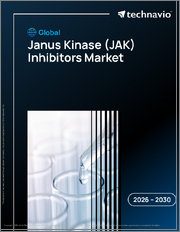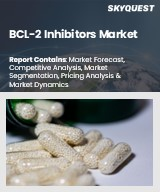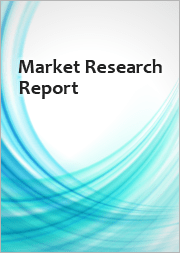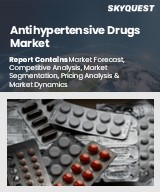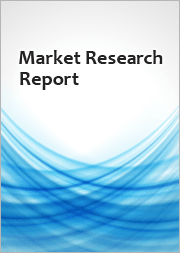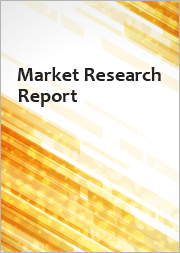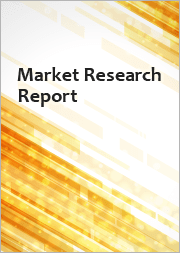
|
시장보고서
상품코드
1444882
α-글루코시다아제 억제제 : 시장 점유율 분석, 산업 동향 및 통계, 성장 예측(2024-2029년)Alpha-glucosidase Inhibitors - Market Share Analysis, Industry Trends & Statistics, Growth Forecasts (2024 - 2029) |
||||||
α-글루코시다아제 억제제 시장 규모는 2024년 47억 6,000만 달러로 추정되며, 2029년까지 53억 달러에 달할 것으로 예상되며, 예측 기간(2024-2029년) 동안 2.17%의 CAGR로 성장할 것으로 예상됩니다.
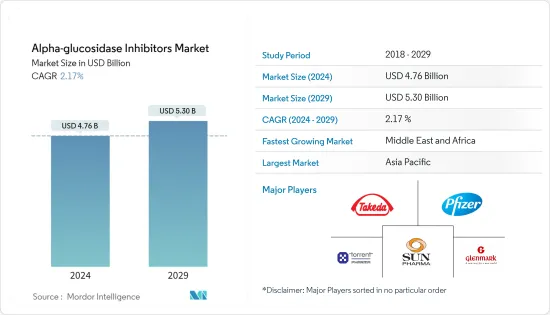
시장 규모는 2027년까지 약 51억 달러에 달할 것으로 추정됩니다.
COVID-19 팬데믹은 α-글루코시다아제 억제제 시장에 긍정적인 영향을 미쳤습니다. 당뇨병과 조절되지 않는 고혈당은 COVID-19 감염 환자의 예후를 악화시키는 위험 요소로, 중증화 또는 사망 위험 증가를 포함합니다. 당뇨병 환자는 면역력이 약하고 COVID-19 감염의 합병증으로 인해 증상이 악화되어 면역력이 빠르게 약화됩니다. 당뇨병 환자는 정상인보다 심각한 합병증에 걸릴 확률이 더 높습니다.
α-글루코시다아제 억제제는 제2형 당뇨병에 사용되는 경구용 항당뇨병제로, 탄수화물의 소화를 막는 작용을 합니다. 탄수화물은 장내 세포에 존재하는 α-글루코시다아제 효소에 의해 단당류로 전환되어 단당류가 장에서 흡수될 수 있도록 합니다. 따라서 α-글루코시다아제 억제제는 식이 탄수화물이 혈당에 미치는 영향을 줄여주며, α-글루코시다아제 억제제는 제2형 당뇨병에서 고혈당에 대한 더 나은 혈당 조절을 확립하는 데 사용됩니다. 이들은 적절한 당뇨병 식단 및 운동과 함께 단독 요법으로 사용하거나 다른 항당뇨병 약물과 함께 사용할 수 있습니다. 따라서 이들은 제2형 당뇨병 유무에 관계없이 COVID-19 감염 환자를 치료할 수 있는 잠재적 후보이며, COVID-19 바이러스 감염이 유행할 때 우수한 항당뇨병(혈당 강하제)이 될 수 있습니다.
2021년 5월, 세계보건총회는 당뇨병 예방 및 관리 강화에 관한 결의안에 합의했습니다. 이 보고서는 당뇨병 치료제 및 건강 제품에 대한 접근성 확대, 당뇨병 치료제 및 건강 제품 시장의 투명성에 대한 정보 공유를 위한 웹 기반 도구 구축의 타당성 및 잠재적 가치 평가와 같은 분야에서 조치를 취할 것을 권고하고 있습니다.
따라서 앞서 언급한 요인으로 인해 조사 대상 시장은 분석 기간 동안 성장할 것으로 예상됩니다.
α-글루코시다아제 억제제 시장 동향
전 세계적으로 당뇨병 유병률 상승
전 세계 당뇨병 인구는 예측 기간 동안 1.9% 증가할 것으로 예상됩니다.
국제당뇨병연맹에 따르면 2021년 성인 당뇨병 인구는 약 5억 3,700만 명이며, 2030년에는 6억 4,300만 명으로 증가할 것으로 예상됩니다. 비만은 주로 제2형 당뇨병을 유발하는 주요 요인 중 하나로 여겨집니다. 당뇨병 환자의 혈당이 계속 상승하면 신장, 신경, 눈 손상과 같은 진행성 합병증을 유발할 수 있습니다.
제 2 형 당뇨병은 점점 더 널리 퍼지고 있으며 심혈관 질환 및 신장 질환의 위험 증가와 관련이 있으며, α- 글루코시다아제 억제제는 내당능 장애가있는 환자에게도 사용할 수 있으며 이러한 환자의 제 2 형 당뇨병 발병을 지연시킬 수 있습니다. 이들은 저혈당증이나 젖산증의 위험이있는 환자에게 특히 유용하며 설 포닐 우레아 약물이나 메트포르민과 같은 다른 항 당뇨병 약물 후보에 적합하지 않으며, α- 글루코시다 아제 억제제는 제 2 형 당뇨병 치료제로 FDA의 승인을 받았습니다.
2021년 4월, 세계보건기구(WHO)는 중저소득 국가 지원에 중점을 두고 당뇨병 예방 및 치료 개선을 위한 세계 노력인 세계당뇨병협약(World Diabetes Compact)을 출범시켰습니다. 이 협약은 각국 정부, 유엔 기구, 비정부기구, 민간 부문 단체, 학술 기관, 자선 단체, 당뇨병을 앓고 있는 사람들, 국제 기부자들을 하나로 묶어줍니다. 이 협약은 당뇨병의 위험을 줄이고, 당뇨병 진단을 받은 모든 사람들이 공평하고 포괄적이며 저렴한 가격으로 양질의 치료와 관리를 받을 수 있도록 한다는 공동의 비전을 달성하기 위해 노력하는 것을 목표로 하고 있습니다.
따라서 조사 대상 시장은 보급률 증가와 위의 요인으로 인해 분석 기간 동안 성장할 것으로 예상됩니다.
중동 및 아프리카는 예측 기간 동안 알파-글루코시다아제 억제제 시장에서 가장 높은 CAGR을 기록할 것으로 예상
예측 기간 동안 중동 및 아프리카는 3.6% 이상의 CAGR을 기록할 것으로 예상됩니다.
아카르보스(프리코스), 보글리보스, 미글리톨(글리세틴)은 α-글루코시다아제 억제제 계열의 약물입니다. 이 약들은 식후 혈중 포도당의 양이 급격히 상승하는 것을 방지하며, α-글루코시다아제 억제제는 식후 당뇨병을 완화하는 데 도움이 될 수 있습니다. 이 약물은 글리코 실화 헤모글로빈 수치를 낮추고 식후 인슐린 농도를 낮추기 때문에 식후 고혈당증은 합병증을 유발할 수 있습니다. 식후 고혈당은 합병증 발생과 관련이 있고 심장 질환의 위험을 증가시키기 때문에 식후 고혈당 조절은 매우 중요합니다.
IDF MENA 지역에서는 2021년 기준 7,300만 명의 성인이 당뇨병을 앓고 있으며, 2030년까지 9,500만 명으로 증가할 것으로 추정되며, IDF MENA 지역 성인 4,800만 명은 제2형 당뇨병 발병 위험을 높이는 내당능 이상 질환을 앓고 있습니다.
정부는 당뇨병의 결과를 통제하기 위한 계획과 정책을 수립하고 있습니다. 예를 들어, 2022년 7월 사우디 정부는 사우디에서 변화로 인해 양질의 의료 서비스에 대한 수요가 증가하고 있다고 발표했습니다. 여기에는 인구 고령화와 당뇨병, 비만과 같은 생활습관병의 유병률 증가가 포함됩니다. 정부와 민간 부문은 의료 기관, 인증 및 규제에 대한 노력에 참여하고 있습니다. 정부는 사우디 국민의 100%가 보험에 가입할 수 있도록 조치를 취하고 있습니다. 또한 저렴한 가격, 접근성, 양질의 디지털 의료, 비용 효율적인 일차 의료를 보장하기 위해 노력하고 있습니다.
상기 요인으로 인해 시장은 예측 기간 동안 성장할 것으로 예상됩니다.
기타 혜택
- 엑셀 형식의 시장 예측(ME) 시트
- 3개월간 애널리스트 지원
목차
제1장 서론
- 조사 가정과 시장 정의
- 조사 범위
제2장 조사 방법
제3장 주요 요약
제4장 시장 역학
- 시장 개요
- 시장 성장 촉진요인
- 시장 성장 억제요인
- Porter's Five Forces 분석
- 공급 기업의 교섭력
- 소비자의 협상력
- 신규 참여업체의 위협
- 대체 제품과 서비스의 위협
- 경쟁 기업간 경쟁 강도
제5장 시장 세분화
- α-글루코시다아제 억제제
- 지역
- 북미
- 미국
- 캐나다
- 기타 북미
- 유럽
- 프랑스
- 독일
- 이탈리아
- 스페인
- 영국
- 러시아
- 기타 유럽
- 라틴아메리카
- 멕시코
- 브라질
- 기타 라틴아메리카
- 아시아태평양
- 일본
- 한국
- 중국
- 인도
- 호주
- 베트남
- 말레이시아
- 인도네시아
- 필리핀
- 태국
- 기타 아시아태평양
- 중동 및 아프리카
- 사우디아라비아
- 이란
- 이집트
- 오만
- 남아프리카공화국
- 기타 중동 및 아프리카
- 북미
제6장 시장 지표
- 1형 당뇨병 인구
- 2형 당뇨병 인구
제7장 경쟁 상황
- 기업 개요
- Bayer
- Takeda
- Pfizer
- Glenmark
- Sun Pharma
- Torrent
- Unichem
- Hexalag
- Eris
- Blue Cross
- 기업 점유율 분석
- Bayer
- Takeda
- Pfizer
- Others
제8장 시장 기회와 향후 동향
ksm 24.03.18The Alpha-glucosidase Inhibitors Market size is estimated at USD 4.76 billion in 2024, and is expected to reach USD 5.30 billion by 2029, growing at a CAGR of 2.17% during the forecast period (2024-2029).

The market is estimated to reach a value of about USD 5.1 billion by 2027.
The COVID-19 pandemic positively impacted the Alpha-glucosidase Inhibitors market. Diabetes and uncontrolled hyperglycemia are risk factors for poor outcomes in patients with COVID-19 including an increased risk of severe illness or death. People with diabetes have a weaker immune system, the COVID-19 complication aggravates the condition, and the immune system gets weaker very fast. People with diabetes have more chances to get into serious complications rather than normal people.
Alpha-glucosidase inhibitors are oral anti-diabetic drugs used for diabetes mellitus type 2 that work by preventing the digestion of carbohydrates. Carbohydrates are converted into monosaccharides by alpha-glucosidase enzymes present in cells lining the intestine, enabling monosaccharides to be absorbed through the intestine. Hence, alpha-glucosidase inhibitors reduce the impact of dietary carbohydrates on blood sugar. Alpha-glucosidase inhibitors are used to establish greater glycemic control over hyperglycemia in diabetes mellitus type 2, they may be used as monotherapy in conjunction with an appropriate diabetic diet and exercise, or they may be used in conjunction with other anti-diabetic drugs. Therefore, they have been potential candidates for treating patients affected by COVID-19 infection, with or even without type 2 diabetes, as well as excellent antidiabetic (glucose-lowering) agents during COVID-19 pandemic times.
In May 2021, the World Health Assembly agreed on a Resolution on strengthening the prevention and control of diabetes. It recommends action in areas including increasing access to medicines and health products for the treatment of diabetes and assessing the feasibility and potential value of establishing a web-based tool to share information relevant to the transparency of markets for diabetes medicines and health products.
Therefore, owing to the aforementioned factors the studied market is anticipated to witness growth over the analysis period.
Alpha-glucosidase Inhibitors Market Trends
Rising diabetes prevalence globally
The diabetes population globally is expected to rise by 1.9% over the forecast period.
According to International Diabetes Federation, the adult diabetes population in 2021 was approximately 537 million, which will increase by 643 million in 2030. Obesity is considered one of the major factors contributing to the disease, primarily Type 2 diabetes. Continued elevation in blood glucose levels in diabetes patients can contribute to progressive complications such as renal, nerve, and ocular damage.
Type 2 diabetes is increasingly prevalent and associated with an increased cardiovascular and renal disease risk. Alpha-glucosidase inhibitors may also be used in patients with impaired glucose tolerance and delay the occurrence of type 2 diabetes mellitus in these patients. They are particularly useful for patients at risk of hypoglycemia or lactic acidosis and are unsuitable candidates for other antidiabetic drugs such as sulfonylureas and metformin. Alpha-glucosidase inhibitors are FDA approved for the treatment of type 2 diabetes mellitus.
In April 2021, WHO launched the Global Diabetes Compact, a global initiative to improve diabetes prevention and care, focusing on supporting low and middle-income countries. The Compact is bringing together national governments, UN organizations, nongovernmental organizations, private sector entities, academic institutions, philanthropic foundations, people living with diabetes, and international donors. The Compact aims to work on a shared vision of reducing the risk of diabetes and ensuring that all people diagnosed with diabetes can access equitable, comprehensive, affordable, and quality treatment and care.
Therefore, the studied market is anticipated to grow over the analysis period due to increased prevalence and the above factors.
Middle East and Africa is expected to register the highest CAGR in Alpha-glucosidase Inhibitors Market over the forecast period
Over the forecast period, the Middle East and Africa region is expected to witness a CAGR of more than 3.6%.
Acarbose (Precose), Voglibose, and miglitol (Glyset) are medications in Alpha-glucosidase inhibitors class of drugs. These drugs help keep the amount of glucose in the blood from rising too fast after meals. Alpha-glucosidase inhibitors help lower postprandial diabetes. These medications reduce glycosylated hemoglobin levels and lower the postprandial insulin concentration. Regulation of post-meal hyperglycemia is vital as it is associated with the development of complications and also increases the risk of heart problems.
73 million adults were living with diabetes in the IDF MENA Region in 2021, which is estimated to increase to 95 million by 2030. 48 million adults in the IDF MENA Region are living with Impaired Glucose Tolerance, which increases their risk of developing type 2 diabetes.
The Government is working on plans and policies to control the outcomes of diabetes. For instance, in July 2022, Saudi Government announced that Saudi Arabia saw a growing demand for quality healthcare services spurred by changes. It includes an increasing aging population and a growing prevalence of lifestyle diseases such as diabetes and obesity. The Government and private sector are involved in working on healthcare entities, certifications, and regulations. The Government is taking steps to include 100% of Saudi citizens covered by insurance. They are also working towards ensuring affordability, access, quality digital healthcare, and primary care with cost-effectiveness.
The market is expected to grow during the forecast period due to the factors above.
Alpha-glucosidase Inhibitors Industry Overview
The Alpha-glucosidase Inhibitors Market studied is highly fragmented, consisting of major manufacturers like Bayer, SunPharma, Pfizer, Takeda, and Zydus, holding a global market presence, and other region-specific manufacturers.
Additional Benefits:
- The market estimate (ME) sheet in Excel format
- 3 months of analyst support
TABLE OF CONTENTS
1 INTRODUCTION
- 1.1 Study Assumptions and Market Definition
- 1.2 Scope of the Study
2 RESEARCH METHODOLOGY
3 EXECUTIVE SUMMARY
4 MARKET DYNAMICS
- 4.1 Market Overview
- 4.2 Market Drivers
- 4.3 Market Restraints
- 4.4 Porter's Five Forces Analysis
- 4.4.1 Bargaining Power of Suppliers
- 4.4.2 Bargaining Power of Consumers
- 4.4.3 Threat of New Entrants
- 4.4.4 Threat of Substitute Products and Services
- 4.4.5 Intensity of Competitive Rivalry
5 MARKET SEGMENTATION
- 5.1 Alpha-glucosidase Inhibitors
- 5.2 Geography
- 5.2.1 North America
- 5.2.1.1 United States
- 5.2.1.2 Canada
- 5.2.1.3 Rest of North America
- 5.2.2 Europe
- 5.2.2.1 France
- 5.2.2.2 Germany
- 5.2.2.3 Italy
- 5.2.2.4 Spain
- 5.2.2.5 United Kingdom
- 5.2.2.6 Russia
- 5.2.2.7 Rest of Europe
- 5.2.3 Latin America
- 5.2.3.1 Mexico
- 5.2.3.2 Brazil
- 5.2.3.3 Rest of Latin America
- 5.2.4 Asia-Pacific
- 5.2.4.1 Japan
- 5.2.4.2 South Korea
- 5.2.4.3 China
- 5.2.4.4 India
- 5.2.4.5 Australia
- 5.2.4.6 Vietnam
- 5.2.4.7 Malaysia
- 5.2.4.8 Indonesia
- 5.2.4.9 Philippines
- 5.2.4.10 Thailand
- 5.2.4.11 Rest of Asia-Pacific
- 5.2.5 Middle East and Africa
- 5.2.5.1 Saudi Arabia
- 5.2.5.2 Iran
- 5.2.5.3 Egypt
- 5.2.5.4 Oman
- 5.2.5.5 South Africa
- 5.2.5.6 Rest of Middle East and Africa
- 5.2.1 North America
6 MARKET INDICATORS
- 6.1 Type-1 Diabetes population
- 6.2 Type-2 Diabetes population
7 COMPETITIVE LANDSCAPE
- 7.1 Company Profiles
- 7.1.1 Bayer
- 7.1.2 Takeda
- 7.1.3 Pfizer
- 7.1.4 Glenmark
- 7.1.5 Sun Pharma
- 7.1.6 Torrent
- 7.1.7 Unichem
- 7.1.8 Hexalag
- 7.1.9 Eris
- 7.1.10 Blue Cross
- 7.2 Company Share Analysis
- 7.2.1 Bayer
- 7.2.2 Takeda
- 7.2.3 Pfizer
- 7.2.4 Others




